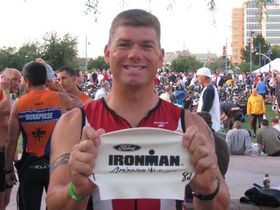 There is plenty of talk around the sport of triathlon about how popular it is has become, and all the newcomers fueling the sport.
There is plenty of talk around the sport of triathlon about how popular it is has become, and all the newcomers fueling the sport.
But this past week I ran into two different people who said they, “used to do triathlons.” Which got me to wondering, is the sport of triathlon a revolving door? For every newbie, how many are tri leavers?
There are all sorts of reasons why a person might leave the sport of triathlon:
-
Time commitment – It’s a significant time commitment to train and compete in triathlons, especially the longer-distance triathlons. In terms of time and energy investment, training for an Ironman triathlon is the equivalent of a part-time, even full-time job.
-
Change of circumstances – Sometimes life circumstances affect your life at a level where you leave the sport of triathlon temporarily or permanently. Some life circumstances might change or re-order your life goals and priorities in a way that bumps triathlon commitments.
-
Injury – There are some who leave the sport of triathlon as a result of injury. Perhaps they had IB Band surgery, an injury caused by triathlon training, and so they have decided against getting back into it.
-
Burn out – Some people overdue it, perpetually push their body to the limit, have no off-season, and ignore the basic principles of rest and recovery. Add these people to the list of tri leavers.
-
Unfulfilled expectations – If your triathlon involvement was a strategy for achieving self-worth or finding a date or outdoing the neighbor you despise and this doesn’t pan out, you might pull the plug on triathlon.
-
Fear of open water swimming – Some percentage of wannabe triathletes go swim in a lake and say, “No frickin way!”
-
Family conflict – For some people, the time and energy investment in triathlon becomes a family conflict, and can cause resentment. The divorce rate among professional triathletes is a consideration.
Reasons To Stick With It
Whatever reason motivates a person into the sport of triathlon, there are benefits of doing so.
Even if you never actually compete in a triathlon, training like a triathlete will help you achieve and maintain an excellent level of fitness.
You simply can’t argue with the wisdom of a triathlon training program that combines running, bicycling, and swimming. The principle of cross-training as a superior way of achieving fitness is well-documented.
Triathlon training emphasizes cardiovascular conditioning, works all the major muscle groups, a healthy nutrition plan, and adds tons of variety to a training program that might otherwise slip into tedium. In other words, it keeps you motivated — which is always job one of any training plan. This is one reason for actually having goals to compete in triathlon events, there’s nothing like a solid and specific goal to keep you motivated.
Not only do you eliminate excuses not to exercise in bad weather (indoor swimming, spinning) but triathlon training will also reduce your overall running related injury potential. In fact, alternating biking and running will help develop all muscle groups in your legs making you a stronger runner. Swimming will make you more limber and develop your upper muscles and increase your lung capacity.
You will want to do some weight work too to strengthen the upper muscles that may “have suffered” from years of neglect by your running (or biking) habits. Your cardiovascular capacity will improve, because you will be able, if you want to, to work out harder 2 or 3 days in a row — just because you will be exercising different muscles. Also, the feeling and difficulty associated with running right after a long bike ride will make you stronger, not only physically but mentally too.
People report various reasons for taking up the sport of triathlon:
“To lose weight.”
“To live more fully.”
“To boost my self-confidence.”
“To push the limits on what is possible.”
“To overcome my fears.”
“To be an inspiration for others.”
“To feel young again.”
“To alleviate stress.”
“To live longer.”
“To make new friends.”
“To learn new skills.”
“To appreciate my body.”
How To Stick With It
Assuming you desire to stick with the sport of triathlon for the long haul, what are some things you can do to increase the chances of that longevity?
1. Follow a good plan.
A year-round periodization triathlon training plan will include adequate rest, recovery, and time off. Left to your own with no plan, these are likely to be the components that are compromised, which means overtraining. All of this works against longevity.
 2. Have long-term goals.
2. Have long-term goals.
You don’t have to accomplish all your triathlon goals in one summer. You can’t go from coach-potato to Ironman in one summer, one season, or one year. Even if you could, why? You have a much better chance in sticking with the sport of triathlon if you will give yourself permission to set more realistic short-term goals, and include having long-term goals.
3. Talk it out.
If the sport of triathlon is something important to you, and you want to make
it a significant part of your life, talk it out with the people that this decision will most affect. For example, this might be your family or close friends. Talking it through on the front end is almost always a helpful step towards preventing future resistance and resentment.
4. Splurge.
Come on, you push your body to its limit; splurge once in a while! Have the massage, eat that 4-layer chocolate cake, and sleep in to 7:30 a.m.
5. Keep the balance: body, mind, and spirit.
Triathlon doesn’t just have to be about you or about what your body can do physically. Have you ever considered that your triathlon involvement is a means to an end? Could that end include growing as a person of love, compassion, peace, courage, and healthy self-reliance? Could the end be serving a greater cause than yourself? Could it be growing in knowledge of all kinds of areas that you currently know very little about? Could your triathlon-related knowledge and experience be put to good use to benefit others in some way? For every triathlete, there’s a story of how triathlon influenced their lives.
6. Do it with others.
“Though one may be overpowered, two can defend themselves. A cord of three strands is not quickly broken.” Ecclesiastes 4:12
I’m over 40 years old, but I don’t give up easily. It wasn’t too long ago that I was exploring the idea of doing my first triathlon. If I can do it, you can too! I'm proof that with a little determination and training, you can get a great deal of fulfillment participating in marathons, triathlons… even ultramarathons.




